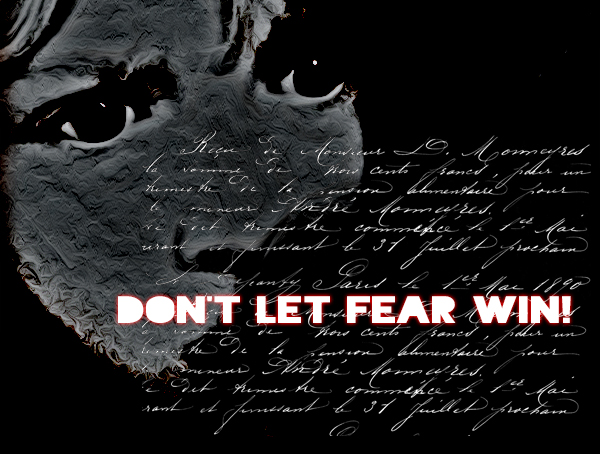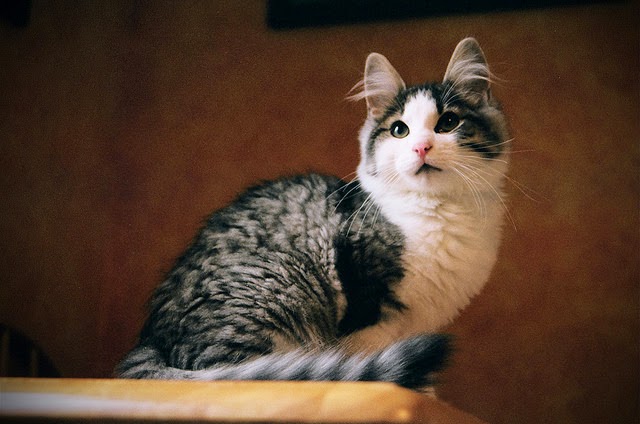“I must not fear. Fear is the mind-killer. Fear is the little-death that brings total obliteration. I will face my fear. I will permit it to pass over me and through me. And when it has gone past I will turn the inner eye to see its path. Where the fear has gone there will be nothing. Only I will remain.”
—Frank Herbert, Dune
Fear is real. It’s that hard fist that twists your gut, that grabs hold of your heart and squeezes. It’s an elevated pulse and the inability to catch your breath.
Everyone’s number one fear is different. Perhaps you might be terrified by the thought of receiving a one star review. Or of your mother/father/grandmother/child discovering you write erotic fiction. Or of publicly putting yourself out there, doing the work, publishing your writing, and failing horribly. Or ... I could go on forever.
Beating The Fear
Here are a few things I do to deal with fear that work for me:
1. Recognize that fear is an emotion.
Often my fear is just a feeling of untethered doom. I’m not afraid of any one thing, the fear just flows through me grabbing the things I’m currently most anxious about and blowing my natural hum-drum concerns WAY out of proportion.
2. Start shutting off the fear by shifting from emotional mode to analytical mode.
This is true for me: the more fearful I am the less rational I am.
I’ve found that strong emotion and analytical thought don’t happen at the same time. If I’m in the middle of an anxiety attack I’m not thinking rationally and vice versa. Which makes sense. If I’m having a fight or flight response the blood is being directed toward the bits of me that are good at either fighting or fleeing. And, sad to say, none of those bits are inside my noggin.
But it’s often difficult to make that transition from run away emotion to analytical thought. Here are a few questions I ask to help me shake the fear, to help me take back control:
3. Name your fear.
By “name” I mean write it down. Be specific. Often fear is just a feeling of untethered doom, it’s not cognitive at all. Force yourself to pin down exactly what you’re afraid of. What are you afraid of losing? If what you fear comes to pass, what would that state of affairs look like?
Sometimes I have quite literally been afraid of nothing. After writing my fear down I realize that even if it came to pass it wouldn’t significantly damage me or anything I care about.
Keep in mind that fear is a shapeshifter, a chameleon. It’s more of a feeling than a thought. As I said, for me it’s often a feeling of doom that wraps it’s black tendrils through me and follows me wherever I go.
Often we don’t really know what we’re afraid of, or the fear shifts, takes on different forms. Since we can’t pin it down it lurks in our head and takes on innumerable forms.
Fear has physical effects that are themselves harmful. It is very difficult to be emotional—and fear is one of the strongest, primal, emotions there is—and thoughtful at the same time. The very presence of fear makes it more difficult to think clearly.
Fear feeds anxiety. Write down what you’re afraid of, pin it down. Be explicit. Detailed. As soon as you see it you can start thinking about it rationally and the fear will begin to lose its power over you.
4. Do something.
In general, doing something is better than doing nothing, even if that something is simply reciting an affirmation like Frank Herbert’s “I must not fear.”
Do nothing and your fear will probably win. If you do something then the fear might still be there but maybe it won’t. If you keep trying, if you keep working at it, you will find something to banish the fear.
Don’t let fear paralyze you. When that happens the fear becomes an endless loop feeding itself, continually growing stronger as you grow weaker.
5. Do something that will make what you fear less likely.
Do something practical that will mitigate the consequences if what you fear comes about. For example, my number one fear used to be that I wouldn’t be able to support myself with my writing. What did I do when the fear hit? I threw my energy into writing and publishing!
6. How likely is it that what you fear will come about?
My fears are generally rational in the sense that they _could_ happen, what I tend to lose sight of is that it is improbable in the extreme that that exact thing will happen.
When you write down your fear be sure to make it specific. Detailed.
Don’t just write: I am scared I will be a failure.
Write: I am scared that after all the years of work I put into my manuscript, after all the money I spent having it edited, that I will publish it and everyone who reads it will hate it and leave a one star review.
There are LOTS of ways to be a failure and it’s easy to give that fear power if we don’t pin it down exactly what we’re afraid of. After we write it down our rational mind can go to work analyzing it and (this has been my experience) it immediately starts to lose it’s power over me. If that doesn’t happen then I’m usually not being specific enough.
7. What can you do to make the fear less likely?
Fear is often a reaction to change or potential change. Change is scary, but it doesn’t have to be. Often change is both good and bad. The trick is to optimize the good and minimize the bad. Ask yourself: what can you do that would make it less likely for what you fear to come about?
For myself: Write more. Publish more. The more one writes and publishes the better one becomes at both. Professional writers aren’t those who have no fear, they are people who have learnt to write anyway to, as Steven Pressfield says, Do The Work.
8. The worst case scenario rarely happens.
When I’m stressed I imagine a worst case scenario. And that might be okay—after all, it’s not a bad idea to prepare for the worst and hope for the best. What I find I have to keep firmly in mind is that this worst case state of affairs isn’t my current state of affairs _and it may never be_.
I want you to imagine something. Imagine a state of affairs, one not as bleak as the worst case scenario your mind/brain/soul is fixated on. Now realize that this future is possible. Perhaps it is just as likely as the bleak one that has been gnawing at you.
9. Every day do one thing that brings you closer to your goal.
Ask yourself: What could I do that would make my fear less likely to come true?
Every day do something that brings you closer to your goal then write it down what you did in your writing journal. Then, at the end of the month, look at what you did that month.
Look at where you were at the beginning of the month and where you are now that the month has come to an end. Realize that you have made progress toward your goal. Realize that you _can_ achieve your goals!
10. Embrace Failure.
If you’re not failing you’re not trying and if you don’t try you’ll never win. Simple as that. To banish fear we must act. We must fail to win.
Every post I pick a book or audiobook I love and recommend it to my readers. This serves two purposes. I want to share what I’ve loved with you, and, if you click the link and buy anything over at Amazon within the next 24 hours, Amazon puts a few cents in my tip jar at no cost to you. So, if you click the link, thank you! If not, that’s okay too. I’m thrilled and honored you’ve visited my blog and read my post. :-)
I’m re-watching the TV show Supernatural. I love that show! Though I love the Sam and Dean characters, they aren’t the stars of the show, the monsters are. This is a monster book for writers: Writing Monsters: How to Craft Believably Terrifying Creatures to Enhance Your Horror, Fantasy, and Science Fiction by Philip Athans with an introduction from the H.P. Lovecraft Historical Society.
That’s it! I’ll talk to you again on Wednesday. In the meantime good writing! Don’t let fear win.






